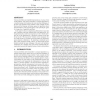Free Online Productivity Tools
i2Speak
i2Symbol
i2OCR
iTex2Img
iWeb2Print
iWeb2Shot
i2Type
iPdf2Split
iPdf2Merge
i2Bopomofo
i2Arabic
i2Style
i2Image
i2PDF
iLatex2Rtf
Sci2ools
111
click to vote
ATAL
2007
Springer
2007
Springer
Children in the forest: towards a canonical problem of spatio-temporal collaboration
Canonical problems are simplified representations of a class of real world problems. They allow researchers to compare algorithms in a standard setting which captures the most important challenges of the real world problems being modeled. Such examples are the block world for planning, two-player games for algorithms which learn the behavior of the opponent agent, or the “split the pie” game for a large class of negotiation problems. In this paper we focus on negotiating collaboration in space and time, a problem with many important real world applications. Although technically a multi-issue negotiation, we show that the problem can not be represented in a satisfactory manner by the split the pie model. We propose the “children in the rectangular forest” (CRF) model as a possible canonical problem for negotiating spatio-temporal collaboration. By exploring a centralized and a peer-to-peer negotiation based solution, we demonstrate that the problem captures the main challenges...
| Added | 07 Jun 2010 |
| Updated | 07 Jun 2010 |
| Type | Conference |
| Year | 2007 |
| Where | ATAL |
| Authors | Yi Luo, Ladislau Bölöni |
Comments (0)

